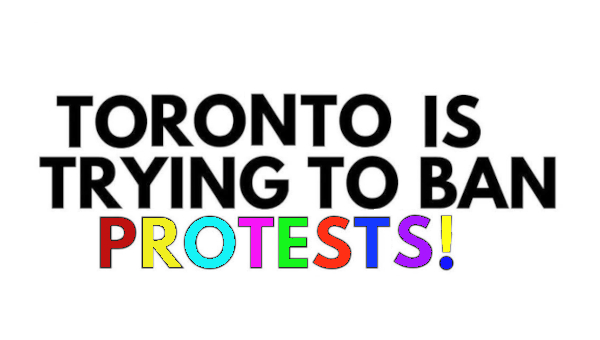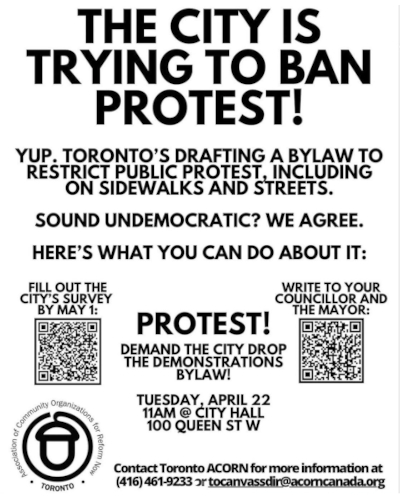Articles Menu

Apr. 22, 2025
Dear Mayor Olivia Chow, City Councillors and City Manager:
We, the undersigned coalition, are writing to strongly oppose the development of a bylaw restricting demonstrations/protests in Toronto, as directed by City Council on December 17-18, 2024.
The type of bylaw that the City of Toronto is currently considering threatens the fundamental freedoms and equality rights enshrined in the Canadian Charter of Rights and Freedoms. Irrespective of how it is designed, any bylaw restricting protest near locations defined as “vulnerable institutions” risks effectively banning protests anywhere in downtown Toronto. It is unacceptable that our City Council, who bears the duty to enhance participation in civic life for all, are instead working to restrict our ability to have our voices heard.

As community members seeking justice and equity, we know protest is critical for achieving change, as demonstrated by Toronto’s rich history of social movements. These protests have confronted injustice, built community power and improved conditions for all.
The framing of the public consultation process on demonstrations that the City of Toronto is currently conducting implies that protests are not in the public interest. It assumes that this form of civic expression threatens society, rather than being a foundational and constructive part of our democratic process. This framing could not be more detached from reality, particularly at this moment when rights and freedoms are being drastically eroded for our neighbours in the United States.
If we don’t fight for our rights, we risk losing those we already have and further eroding those that are inadequate.
Canada was built on the suppression of Indigenous peoples’ inherent rights, broken treaties, and the enslavement of Africans. It has perpetrated rights abuses of peoples here and abroad, since its founding. We know that the Charter has not provided equal protection to all people. Demonstrations, in all forms, and in all settings, are a necessary tool for addressing historical harms and moving Canada’s democracy forward toward full realization.
The Criminal Code already addresses illegal activities during protests, including mischief (Section 430), public incitement of hatred (Section 319), and causing a disturbance (Section 175). New tools to suppress speech or assembly are unnecessary when existing frameworks address public safety concerns without infringing on Charter rights. Reduction of discomfort or distaste from people encountering protests should not be a driver of new bylaws.
We must be clear-eyed about the context and timing of the bylaw that the City of Toronto is currently considering and others like it. This measure appears deliberately designed to silence Palestinians and their allies who have been exercising their democratic rights to protest against ongoing genocide (as identified by many human rights and international law experts and organizations), and the complicity of Canadian governments, institutions, and individuals. Demonstrations on other issues have not been met with similar calls for suppression. This selective targeting of specific political expression contradicts Canada’s commitment to pluralism and the Ontario Human Rights Code, which prohibits discrimination based on ancestry, ethnicity, place of origin, and creed. This targeting is inconsistent with Toronto’s vision statement on Access, Equity and Diversity, which commits to “creat[ing] an environment of equality in the government and in the community for all people.” Instead, the City should undertake public education about democratic expression and participation to enhance understanding and acceptance of demonstrations.
A bylaw restricting where and how people can protest would stifle rights-seeking groups’ access to essential means of being seen and heard. For many of these communities, protest is the main means through which democratic engagement occurs. To limit it would contradict the City’s own strategies and initiatives such as the Action Plan to Confront Anti-Black Racism, the Poverty Reduction Strategy, the Toronto Newcomer Strategy, and Toronto for All. It would expose “would-be protesters” (i.e. those seeking social change or responding to injustices) to unfair bias and public disapproval. It would heighten the prospect of criminalization and further subject people to unnecessary surveillance and overreach from bylaw enforcement and policing.

Such a bylaw cannot be enforced fairly when systemic racism influences policing, as experienced by generations of racialized people and documented in the Toronto Police Service’s Race and Identity-Based Data Collection Strategy. As many Indigenous, Black, and Rights-seeking communities utilize protest to have their voices heard, they would be disproportionately impacted by enforcement of this bylaw. It would further harm the people who the City of Toronto is mandated to help, and harm them in ways that the City is specifically trying to mitigate.
The type of bylaw the City of Toronto is currently considering would thwart Truth and Reconciliation by preventing Indigenous people from confronting institutions that perpetuate colonial harms — including places of worship, schools and hospitals. This contradicts Toronto’s commitments to Indigenous peoples, including the Reconciliation Action Plan. A guiding principle of the Plan is that reconciliation “requires public truth sharing.” In this same document, the City says it will “[d]ecolonize City processes and policies that create barriers to Indigenous People’s access to land and water” and take steps to “return lands and stewardship rights,” yet a bylaw would conflict with these strategic actions by increasing colonial control instead.
The institutions that the City of Toronto has indicated it is considering as “vulnerable” have been responsible for mistreatment and discrimination, historically and recently. Restricting protests near these institutions would shield them from accountability. For example, there are very productive critiques of psychiatry being articulated by former patients of the Centre for Addiction and Mental Health. Hospitals and schools have long histories of perpetuating harms against racialized and low-income populations. Religious institutions operated most residential schools, where they perpetrated cultural genocide, a high incidence of physical and sexual abuse of children, systematic starvation and denial of healthcare, leading to numerous deaths.
Recently, climate change activism and social equity demands have been led from classrooms — this would also be constrained by limits on protests in proximity of schools.
Criminal Code Sections 423.2, 430.4.1 and 176.2 already address illegal activities of intimidation, and obstruction or interference of access to health care, mischief relating to religious or cultural institutions, schools, and daycares motivated by bias, prejudice or hate, and disturbing religious worship, respectively. A municipal bylaw is unnecessary.
Workplaces must remain potential, uncontestable sites for demonstration in all its forms to uphold association and collective bargaining rights. From shop-floor action, to strikes, to support rallies, we submit that all must be available to all workers, without interference from the City. The Ontario Labour Relations Act protects the right to strike, and the Supreme Court in Saskatchewan Federation of Labour v. Saskatchewan recognized striking as protected under the Charter.
Any proposed “carve out” in an anti-protest bylaw for strike pickets (as was created in the Vaughan bylaw) is not of interest, and not consistent with our full rights.
Toronto should not waste resources on a bylaw that cannot withstand constitutional challenge. This conflicts with Toronto’s long-term financial plan to address the already large fiscal budget gap by inviting costly legal battles.
Toronto’s Official Plan Section 3.1.1 affirms the importance of public space for the city’s liveability, unity, culture and identity, and describes a plan to enhance and expand what is public. A bylaw restricting where and how people can protest would further create obstacles to the use and expansion of public space, contradicting the Plan.
The right to protest has driven social progress throughout Canadian history. Saying no to an anti-protest bylaw in Toronto is not just about protecting our Charter rights in our city; it’s about protecting the rights of all Canadians. Looking at the United States, we can see in real time how the incremental erosion of rights leads to more severe eradication of basic freedoms. We must put a stop to this threat now.
We call on Mayor Olivia Chow and City Council to vote against any anti-protest bylaw. •
Sincerely,
The following members of the Coalition for Charter Rights and Freedoms:
350 Canada
All Peoples Fighting Oppression
Amnesty International Canada, English Speaking
Another Toronto is Possible
Arab Canadian Lawyers Association
Canadian Muslim Public Affairs Council (CMPAC)
Catholics for Justice and Peace in the Holy Land
The Chinese Canadian National Council Toronto Chapter
Climate4Palestine Toronto
CUPE Local 2484 Toronto Child Care Workers Union
CUPE Local 3903
Davenport for Palestine
East End Acts
Etobicoke South for Palestine
Faith and Climate Action
Fridays for Future Toronto
Friends of Palestine Canada
Harm Reduction Advocacy Collective
Harm Reduction Action Collective (HRAC)
HumanistCeremonies.ca
IfNotNow Toronto
Independent Jewish Voices Toronto & York Region
Injured Workers Action for Justice
Injured Workers Community Legal Clinic
Irish4Palestine
Jews Say No to Genocide
Just Peace Advocates/Mouvement Pour Une Paix Juste
The Legal Clinic at the Lincoln Alexander School of Law at Toronto Metropolitan University
Migrante Canada
Migrant Workers Alliance for Change
Milton Palestine Action Committee
Oakville-Halton 4 Palestine
Ontario Palestinian Rights Association (OPRA)
Orange Hats
Palestine Network - Shining Waters (PalNet), a partner organization of the Social and Ecological Justice Commission
within the Shining Waters Regional Council of the United Church of Canada
Pax Christi
Peel Palestinian Families
PYM - Toronto
Queers 4 Palestine - Toronto
Saskatoon Chapter of Canadians for Justice and Peace in the Middle East
Scarborough Southwest for Palestine
Science for the People Canada
Socialist Action
Standing Up for Racial Justice Toronto (SURJTO)
TMU Alumni for Palestine
Toronto Centre for Palestine
Toronto East Residents for Renewable Energy (TERRE)
Toronto—St. Paul's for Palestine
Toronto Raging Grannies
Toronto World BEYOND War
TTCriders
United Jewish Peoples’ Order (UJPO)
United Network for Justice and Peace in Palestine and Israel (UNJPPI)
University-Rosedale for Palestine
Wildseed Centre for Art & Activism
Winchevsky Centre
World BEYOND War Canada
York South-Weston Tenant Union
coalition4charterrights@gmail.com